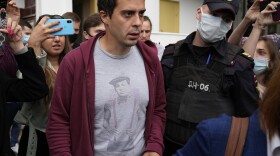RACHEL MARTIN, HOST:
Russians go to the polls this Sunday, and Vladimir Putin is expected to win a fourth term as Russia's president - no surprise. He's probably going to win by a landslide. Opinion polls consistently show that most Russians approve of him. But, as NPR's Lucian Kim found out, attitudes towards Putin are changing, even in Russia's conservative heartland.
(SOUNDBITE OF TRAIN WHISTLE BLOWING)
LUCIAN KIM, BYLINE: Take a train two hours south of Moscow, and you arrive in Tula, a town famous for the manufacture of weapons and gingerbread.
(SOUNDBITE OF TRAIN ARRIVING IN STATION)
UNIDENTIFIED ANNOUNCER: (Speaking Russian).
KIM: Here I meet Maxim Bakhlin (ph), a young doctor who dreams of turning Russia into a European democracy.
(Speaking Russian).
MAXIM BAKHLIN: Nice to meet you.
KIM: Nice to meet you.
Bakhlin is a lanky 23-year-old doing his internship in a village clinic about 20 minutes out of town. He became interested in politics after watching YouTube videos featuring the opposition leader Alexei Navalny.
BAKHLIN: (Through interpreter) When Navalny appeared, he immediately drew people's interest. He's young and ambitious, says the right things and isn't afraid to investigate our corrupt officials. You start thinking, if people start following him, maybe one day Russia will change.
KIM: As an opposition supporter, Bakhlin was in a minority at medical school. And now back home in Tula, he says he still feels like an outsider for questioning the way Russia is governed.
BAKHLIN: (Through interpreter) Many people just don't ask themselves these kind of questions. They're used to enduring. This Russian patience doesn't have any limits. But I can't tolerate it.
(SOUNDBITE OF TRAFFIC)
KIM: On Tula's Central Square, you can see a hulking, seven-story block of concrete, which is City Hall, a statue of Vladimir Lenin, the founder of the Soviet Union, and a gigantic banner reminding citizens to come out and vote on March 18. One person they won't be able to vote for is the opposition leader, Alexei Navalny, who was banned from running. Even if he had been a candidate, Sofiya Kastilo (ph), a 28-year-old English teacher, says he could never replace Vladimir Putin.
SOFIYA KASTILO: Putin's behavior, you know, shows off that he's a real leader. He's practically always very quiet, calm, and he can express his opinion very firmly. And what about Navalny? He is always arguing, shouting and he's, like, on a medieval fair. He's trying to argue with everyone surrounding him.
KIM: Kastilo doesn't deny that Russia has its share of problems, but she says Navalny doesn't present a viable alternative to Putin.
KASTILO: Speaking about corruption, well, it existed, it exists and it will exist. And if Navalny becomes the president, where is the guarantee that there won't be any corruption? There is no guarantee. He can't guarantee this.
KIM: Bakhlin, the aspiring doctor, has heard these arguments before, from his own parents, who lost their jobs after the collapse of the Soviet Union. They're grateful to Putin for restoring stability and helping them get back on their feet. A supermarket cashier and a driver at the local brewery, Bakhlin's parents put their son through medical school and now are taking their first vacation abroad to the Canary Islands. I asked Bakhlin if they're disappointed in him.
BAKHLIN: (Through interpreter) No, not disappointed. They're more skeptical. When I tell my mom about a new corruption investigation, she smiles at her revolutionary son. But my dad really loves getting into verbal battles with me.
KIM: Bakhlin says he still hopes to win them over. But on Sunday, when he follows Navalny's call to boycott the election, his parents will support Putin for another six years. Lucian Kim, NPR News, Tula. Transcript provided by NPR, Copyright NPR.





